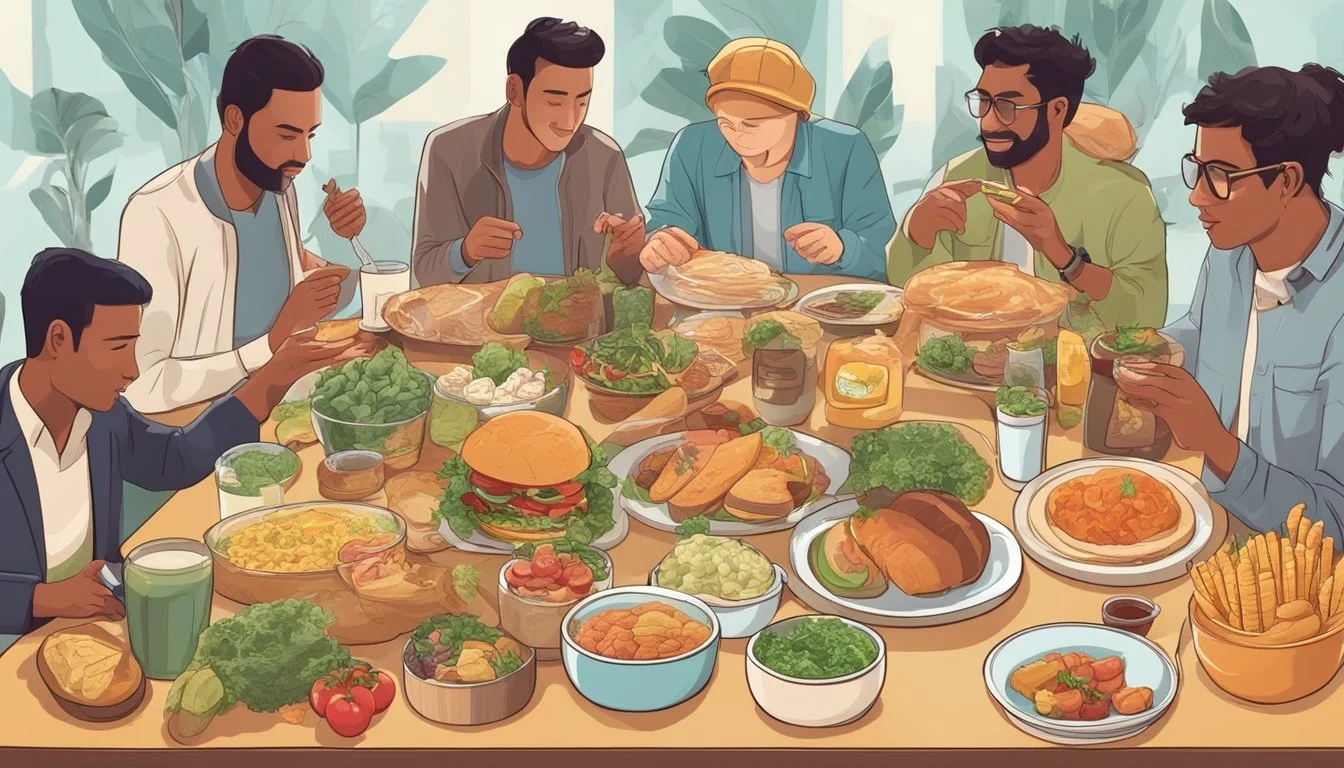7 Ways to Deal with Social Situations on the Carnivore Diet
Expert Tips
Navigating social situations can be a challenge for those adhering to the carnivore diet, a dietary plan that focuses exclusively on animal products. Social events often revolve around diverse food choices, creating potential obstacles for individuals committed to this restrictive eating style.
To successfully manage social scenarios while following a carnivore diet, preparation and effective communication play critical roles. By proactively planning and openly discussing dietary constraints, one can maintain a carnivore diet without feeling isolated or limited during social gatherings.
1) Plan Ahead: Prep Your Meals
On a carnivore diet, meal planning is key. Preparing meals in advance helps maintain dietary consistency and reduces the temptation to eat non-compliant foods. Start by clearing your fridge and pantry of all plant foods and processed items. Stock up only on animal-based products like beef, pork, and other meats.
Batch cooking is a useful strategy. Cook large quantities of meat, such as roasted beef or grilled chicken, and store them in portions. This ensures you always have a meal ready, even on busy days. Use resealable bags or containers to keep your meals fresh and easily accessible.
In addition to cooking, portioning your meals can make a significant difference. Separating your prepared meats into individual servings can help manage portions and keep you on track. This method is particularly helpful for those with hectic schedules.
Include a variety of meats in your meal prep to avoid monotony. Explore different cuts and types of meat, such as ribs, steaks, and sausages. Incorporating variety keeps meals interesting and satisfying.
Lastly, plan for your social events. If you anticipate dining out or attending gatherings, prepare carnivore-friendly snacks in advance. This way, you won't feel deprived and can stay true to your diet plan.
2) Choose Meat-Based Restaurants
Finding the right restaurant is a key strategy for those on a carnivore diet. Selecting establishments that specialize in meat ensures access to a variety of suitable meal options.
Steak houses and barbecue joints are ideal choices. These venues offer a wide range of meat dishes that align with carnivore diet principles.
Fast food chains known for serving 100% beef patties, such as Five Guys or Wendy's, can also be a practical option. Always inquire about cooking methods to confirm they meet carnivore criteria.
Avoid places that focus on plant-based or vegetarian menus. These restaurants may lack sufficient meat options, making it difficult to adhere to diet requirements.
Choosing meat-based restaurants can greatly simplify dining out experiences. It supports staying true to dietary preferences without unnecessary stress.
3) Communicate Your Diet Preferences
Clear communication about dietary choices is crucial in social settings. Sharing specifics about food preferences helps others understand and accommodate your needs without confusion.
When attending gatherings, inform hosts ahead of time. This allows them to plan meals that include options suitable for a carnivore diet.
Be direct but polite when explaining your diet. Avoid lengthy justifications; a brief explanation usually suffices.
Having a simple statement ready can be helpful. For instance, "I follow a carnivore diet and focus on eating only meat and animal products."
Ensure those around you understand that your dietary choice is important for your health and well-being. This fosters respect and minimizes misunderstandings.
Offering to bring your own food can ease potential burdens on the host. This also ensures you have something to eat that aligns with your diet.
Engaging in open conversations about your diet helps educate others. It also provides an opportunity to address any questions or concerns they might have.
Ultimately, effective communication about your diet preferences can make social interactions smoother. It helps maintain positive relationships while staying committed to your dietary goals.
4) Bring Your Own Snacks
Bringing your own snacks to social events is a practical way to stick to the carnivore diet. It ensures that you have suitable options available and aren't tempted by non-carnivore foods.
Preparing carnivore-friendly snacks in advance can help. Simple options include beef jerky, hard-boiled eggs, or slices of deli meat. These are easy to transport and require minimal preparation.
It's also good to consider portions. Bringing enough to share can foster positive interactions and even spark interest in your dietary choices. This approach creates a sense of inclusion without compromising diet adherence.
Being prepared demonstrates a proactive approach to your health goals. It enables you to enjoy social events without stress or feeling left out.
5) Stick to Non-Alcoholic Drinks
Choosing non-alcoholic drinks is beneficial when following the carnivore diet. Alcoholic beverages can contain sugars, carbohydrates, and other ingredients that are not aligned with this way of eating. Opting for non-alcoholic options helps maintain dietary consistency.
Non-alcoholic drinks come in a variety of forms that can complement a carnivore lifestyle. Sparkling water, herbal teas, and black coffee are good choices. These beverages are generally free from carbohydrates and sugars, making them suitable for the diet.
Another advantage of non-alcoholic drinks is avoiding unnecessary calories. Alcohol often adds to daily caloric intake, which may not be ideal for some individuals. Sticking to zero-calorie options supports the diet's focus on nutrient-dense animal products.
When attending social events, it may help to bring your own non-alcoholic drinks. This ensures that you have options that align with your dietary needs. It also helps avoid peer pressure to consume alcohol.
Ultimately, choosing non-alcoholic beverages supports overall health and adherence to the carnivore diet. By making thoughtful drink choices, individuals can navigate social situations without compromising their dietary goals.
6) Avoid Social Dining Traps
Social dining often presents challenges for those on a carnivore diet.
When attending events, they should focus on main dishes that align with their dietary needs, such as steak or roast.
Opting for animal-based sides like eggs or bacon can also be beneficial.
It's best to request meals without sauces, as these often contain non-carnivore ingredients like sugars or vegetable oils.
At restaurants, reviewing the menu ahead of time can help make informed choices.
They should communicate their dietary restrictions to the server to ensure their needs are met.
Some may find it useful to eat a small carnivore-friendly meal before attending an event to avoid the temptation of non-compliant foods.
Keeping a stash of suitable snacks on hand can provide a quick solution if needed.
7) Stay Educated About Ingredients
Understanding what goes into the food you consume is critical on a carnivore diet. Knowing the ingredients ensures you stay true to your dietary principles and avoid sneaky additives.
Reading labels is essential. Many processed meats and packaged foods contain hidden sugars, preservatives, and other non-carnivore-friendly ingredients.
Ask questions when dining out. Inquire about the preparation methods and ingredients used. This helps avoid unintended consumption of oils, sauces, or seasonings that may have plant-based additives.
Research common food items and their typical additives. Awareness of what’s often included in sausages, jerky, or deli meats can help make informed choices.
Staying informed allows for better decision-making and helps maintain the integrity of a carnivore diet in various social situations.
Understanding the Carnivore Diet
The Carnivore Diet focuses on consuming primarily animal products. This section will explain its core principles, nutritional aspects, and dispel some common misconceptions.
What is the Carnivore Diet?
The Carnivore Diet involves eating exclusively animal products such as meat, fish, eggs, and animal-based fats. Dairy is sometimes included but often in limited quantities. Proponents believe it can improve various health markers by eliminating plant-based foods, which they argue contain antinutrients and potential allergens.
Essentially, the diet is an extension of low-carb regimes like the ketogenic diet but taken further to eliminate all plant-based carbohydrates.
Nutritional Considerations
The diet is high in protein and fats while being virtually devoid of carbohydrates. Key nutrients such as essential amino acids, omega-3 fatty acids, and certain vitamins (like B12) are abundant in animal products.
Vitamins and minerals in animal foods:
Vitamin B12: Found abundantly in liver and red meat.
Iron: Heme iron from meat is highly absorbable.
Omega-3s: Present in fatty fish and grass-fed meats.
The diet can be low in dietary fiber and certain vitamins like C and E, typically found in plant sources, which may require careful planning or supplementation.
I really suggest buying fiber, vitamin C, and vitamin E online for an easy shopping experience!
Common Misconceptions
Many believe the Carnivore Diet lacks sufficient nutrients or is overly restrictive. Critics often argue that a plant-free diet is inherently unhealthy.
Common misconceptions include:
It's devoid of vitamins: Animal products offer many vital nutrients.
Leads to deficiencies: While certain nutrients need attention, careful planning can mitigate risks.
Cannot be sustainable: Many adhere to the diet long-term without major issues, though it requires commitment and monitoring.
Recognizing and addressing these misconceptions can help in understanding the diet’s true impact on health.
Navigating Social Settings
When adhering to a carnivore diet, managing social settings involves clear communication of dietary choices and strategic planning for dining out. Being prepared ensures a smooth experience without compromising social interactions.
Communicating Your Dietary Choices
Effective communication is key. Clearly explain the principles of the carnivore diet to friends and family. This involves detailing that your diet exclusively includes animal products and excludes plant-based foods.
Open discussions facilitate understanding and respect for dietary needs. When receiving invitations, be honest about your preferences. Offer to bring your own dish to social events to ensure you have suitable options. This proactive approach minimizes confusion and helps others accommodate your needs without feeling burdened.
Utilize social media groups and forums to connect with like-minded individuals. These communities offer valuable tips and support for handling social interactions. Sharing experiences and strategies can increase your confidence in explaining your dietary preferences and navigating various social scenarios.
Dining Out Strategies
Planning is essential when dining out. Research restaurant menus in advance to identify suitable carnivore-friendly options. Most restaurants can accommodate dietary restrictions if you communicate them clearly.
Choose places known for high-quality meat dishes, such as steakhouses or barbecue joints. Customize your order by asking for modifications, like replacing sides with extra meat or opting out of sauces that may contain non-carnivore ingredients.
Consider calling ahead to inquire about the menu or special accommodations. Some establishments might even prepare a specific dish to meet your dietary needs. Bringing your own small condiments or seasonings can also enhance your meal without the risk of consuming unsuitable ingredients.
Maintaining Relationships While On the Diet
Successfully maintaining relationships while on a carnivore diet involves effective communication and understanding the needs of those around you. This can include making dietary adjustments and finding common ground in social settings.
Balancing Social Dynamics
One key approach is open communication with friends and family about your dietary choices. Explain the reasons behind your decision to follow the carnivore diet, and emphasize how it positively impacts your health. This transparency can foster understanding and reduce potential tensions.
Planning ahead for social events is also crucial. Inform hosts or organizers about your dietary restrictions and offer to bring a carnivore-friendly dish. This not only ensures you have food you can eat but also shows your willingness to participate in and contribute to the gathering.
Flexibility is vital. While maintaining your dietary principles, consider relaxing them slightly in social situations. For instance, focusing on the social experience rather than the food can reduce stress. Opt for meat-based options available and avoid drawing attention to the differences in your diet.
Supporting Friends and Family
Supporting your friends and family while maintaining your carnivore diet can strengthen relationships. Make an effort to engage with them in non-food-related activities like hikes, games, or project collaborations. This diversifies bonding opportunities and reduces the dietary focus.
Encourage your loved ones to ask questions about your diet. Being informative and open can build mutual respect and understanding. Share recipes and cooking tips with those interested, turning meal preparation into a shared, enjoyable experience.
It's also important to respect the dietary choices of others. Avoid preaching about the carnivore diet and acknowledge that different diets work for different people. By showing respect for their eating habits, you contribute to a more harmonious relationship.











